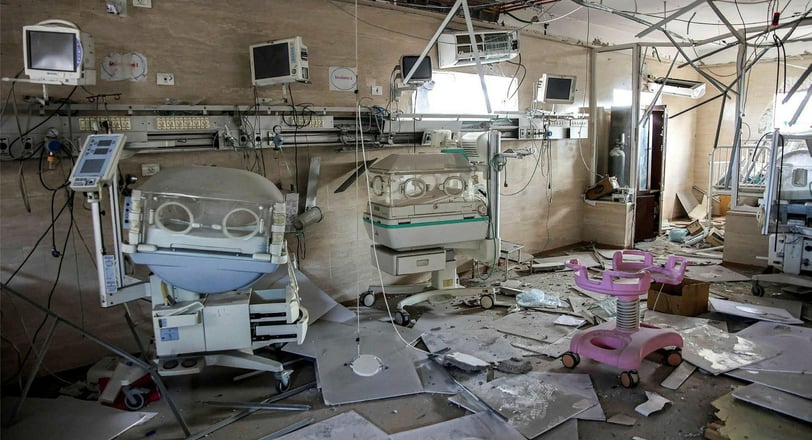Patients in Gaza Are Dying Slowly: Israel’s Blockade Denies Treatment and Shuts the Doors to Survival
Thousands of sick and wounded Palestinians in Gaza are trapped without treatment as Israel tightens its blockade, closes crossings, and blocks urgent medical evacuations. Over 500 patients have died waiting.
REPORT
Refaat Ibrahim
6/29/20253 min read


Under relentless siege and bombardment, thousands of wounded and sick Palestinians in Gaza are enduring a double tragedy. While Israel's military aggression continues to claim lives, those who survive face suffocating restrictions that prevent them from traveling abroad for medical care.
These patients find themselves held hostage in besieged hospitals without medicine, without access to treatment, and without any guarantees of survival.
Closed Crossings, Cut-Off Hope
Since Israel launched its war on Gaza in October 2023, it has imposed unprecedented restrictions on the movement of the wounded and sick. The situation worsened dramatically after the occupation closed all border crossings, including the Rafah crossing with Egypt on May 6, 2024, following its invasion and full military control of the city of Rafah, Gaza’s last gateway to the outside world.
This closure has rendered the fate of thousands of patients subject to Israeli decision-making in a context where local healthcare infrastructure has been decimated. Gaza now suffers from a catastrophic shortage of medicine, medical equipment, and functioning hospitals capable of handling critical cases.
Dying Without Leaving Their Hospital Beds
According to Dr. Ahmad Al-Farra, director of the Evacuation Unit for Patients at the Ministry of Health and head of Pediatrics and Obstetrics at Nasser Medical Complex, more than 14,000 patients and wounded individuals are on official evacuation lists for treatment abroad. Of these, 546 have died while waiting for access to life-saving medical care.
Dr. Al-Farra described the situation as a "silent massacre," accusing Israel of deliberately obstructing patient travel by imposing arbitrary and complex procedures. The process, he said, selectively permits only a few individuals to exit through Israeli-controlled crossings, often based on opaque and politicized criteria.
“We are not speaking in numbers. These are human lives, fading away in front of our eyes while the world remains silent,” Al-Farra said.
We warned that if crossings remain shut and international actors fail to intervene, the number of patient deaths will continue to rise.
Kidney and Cancer Patients Face Imminent Death
Among the most critically affected are kidney failure and cancer patients. According to the Palestinian Ministry of Health, over 40% of Gaza’s 1,150 kidney patients have died since the war began, either due to lack of dialysis access or travel bans preventing treatment abroad.
The situation for cancer patients is equally dire. The ministry announced the complete shutdown of chemotherapy services and medical follow-up due to the evacuation and destruction of the European Hospital and the Gaza Cancer Center. This has left 11,000 cancer patients without access to essential care, including 5,000 with urgent referrals for diagnosis and treatment abroad.
An alarming 64% of cancer medications are now completely unavailable, and the lack of diagnostic and monitoring equipment has accelerated the deterioration of patients’ conditions, pushing many into late-stage illness with no possibility of intervention.
Lives Crushed on Every Level
The suffering of Gaza’s patients is not only medical. Many endure unbearable psychological, social, and economic hardships, surrounded by fear, anxiety, and a pervasive sense of helplessness.
The Health Ministry described the cancer patients’ condition as “catastrophic on every level,” urging the international community to take immediate steps to
Reopen Gaza’s crossings immediately.
Allow urgent patient evacuations for treatment.
Deliver essential medications and medical equipment.
Despite countless warnings, Israel continues to seal Gaza off, while global institutions appear unable or unwilling to act meaningfully to prevent what is being described as a full-blown medical disaster.
Doctors Facing the Impossible
In the few hospitals still partially operating, medical staff face impossible choices. With little or no supplies, no fuel, and no electricity, doctors must decide who receives care and who is left to die.
A doctor at Nasser Medical Complex, speaking anonymously for security reasons, said:
“We are under unbearable pressure. We’re watching children, young people, and the elderly die in our arms, and we can do nothing. No medicine. No equipment. Just fading hope.”
Medical teams face continuous crises: lack of oxygen, power outages, direct attacks on medical facilities, and fuel shortages that halt dialysis and ICU services.
Appeals Ignored by the World
Numerous human rights organizations have condemned Israel’s obstruction of medical evacuations as a grave violation of international humanitarian law, calling it a war crime. Israel retains complete control over Gaza’s crossings and enforces restrictions using military and political calculations rather than humanitarian criteria.
But despite these legal and moral alarms, no real international pressure has been applied. The UN and global health institutions have yet to take decisive steps to force Israel to allow medicine in or enable humanitarian corridors.
Saving Lives Is Not Optional It’s a Legal and Moral Duty
The suffering of Gaza’s sick and wounded is not a peripheral issue. Every passing day costs more lives, not from missiles, but from blocked borders and withheld medicine.
If the international community is serious about its humanitarian commitments, it must act now: open the crossings, evacuate the sick, and provide emergency medical supplies.
In Gaza, death is no longer a result of airstrikes alone. It is an administrative decision, made behind closed doors by an occupying power, as the world looks the other way.
Source:
Palestinian Ministry of Health
Field Testimonies from Medical Officials
Data from medical and human rights organizations.
Awareness
Documenting reality, amplifying Palestinian voices, raising awareness.
Contact Us:
resistant.p.pens@gmail.com
Follow our social media
